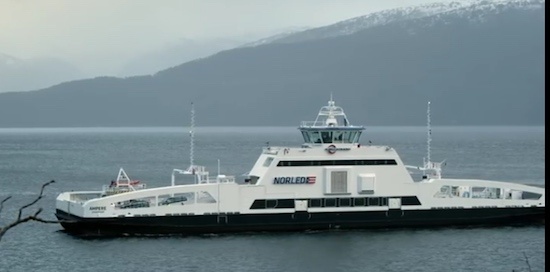
 New data has shown that one of the world’s first all-electric car ferries, commissioned by Norwegian shipping company Norled, and co-designed by German engineering giant Siemens, has cut carbon emissions reduced by 95 per cent and operating cost by 80 per cent compared to its traditional fuel-powered counterparts.
New data has shown that one of the world’s first all-electric car ferries, commissioned by Norwegian shipping company Norled, and co-designed by German engineering giant Siemens, has cut carbon emissions reduced by 95 per cent and operating cost by 80 per cent compared to its traditional fuel-powered counterparts.
The impressive data, revealed at the Nordic EV summit in Oslo last week, is reportedly better than expected from the ferry – which was launched in 2015, and is called Ampere – and has resulted 53 further orders for Noregian shipbuilder Fjellstrand.
Norway’s first all-electric ferry has reduced CO2 by 95%, operating cost by 80%, resulting in 53 further orders for shipbuilder Fjellstrand. Electric #mobility turns into success story for country’s #maritime industry. #NordicEVS #EV pic.twitter.com/G5TVTcWZPm
— Rolf Wüstenhagen (@wuestenhagen) February 2, 2018
Norled itself has obviously been happy with the performance of the ferry, having already commissioned another, called Elektra, which was launched last year.
As Elektrek explains, the ferry is the fruit of a partnership between Norled, Fjellstrand Shipyard, Siemens and Corvus Energy – the latter two of which developed the boat’s electric powertrain and battery system, giving it more than 1 MWh of capacity.
The website also notes that ferries are prefect candidates for electrification, due to the fact that they often travel short distances and dock for relatively long periods of time at established ports, where they can be charged.

Elektrek says that Norled have been charging their ferries through battery packs at each port, which helps maintain a high charge rate while reducing peak demand costs.
And they are not the only electric ferries around. In 2017, ABB was working on converting two of Sweden’s HH Ferries Group’s massive ferries from diesel engines to 100 per cent battery-powered.
New large all-electric container barges dubbed ‘Tesla ships’ are also launching this autumn and an new all-electric cargo ship with a massive 2.4 MWh battery pack recently launched in China.
If you ask me, things are becoming extremely interesting on this front.
And just last month, Dutch company Port Liner revealed that five autonomous electric barges were set to begin operating between the De Kempen intermodal terminal in the south of the Netherlands and Antwerp beginning in August of this year.
Cleantechnica reports that the “Tesla Barges” have – designed to fit beneath the many bridges found in the Netherlands and Belgium – are expected to displace as many as 23,000 trucks, most of them diesel powered, from area roads.
And, of course, China is in the game, having launched the world’s first electric cargo ship in December of last year, which it is using to ship… coal.

Sophie is editor of One Step Off The Grid and editor of its sister site, Renew Economy. Sophie has been writing about clean energy for more than a decade.
